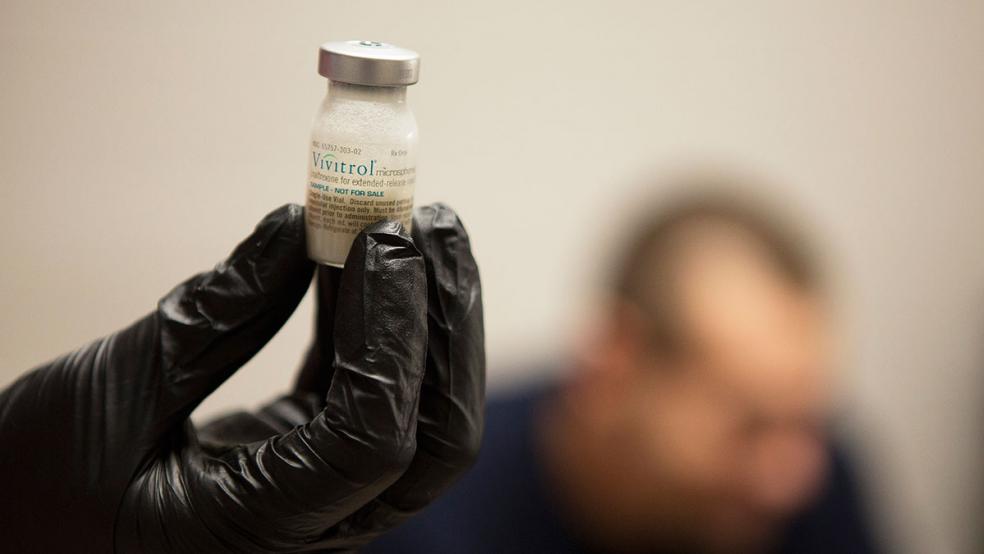A nationwide epidemic of prescription drug addiction so alarmed lawmakers and the White House this year that Congress passed major legislation in July to police and treat opioid abuse.
The government has estimated that more than two million Americans are opioid abusers and that nearly 500,000 more are heroin addicts. In 2014 alone, there were more than 47,000 deaths related to prescription drug abuse – or twice the death rate in 2000.
Related: As Heroin Addiction Grows Like a Cancer, Obama Orders New Health Treatments
Although lawmakers approved only about half the $1.1 billion President Obama requested, the legislation was viewed as an important first step. It includes grants and other programs designed to help law enforcement officials and health care experts identify and treat heroin and prescription drug abuse.
This is a problem that once was largely confined to urban areas but now is rampant in suburban and rural areas.
Major pharmaceutical companies have publicly voiced support for steps to combat or reduce the addiction epidemic, particularly after it became an important issue during the presidential primaries this year. In May, PhRMA, the major pharmaceutical research and manufacturing trade organization, declared in a statement, “Given the growing toll related to the abuse of prescription opioids and heroin, we must collectively redouble our efforts to prevent the misuse, abuse and diversion of prescription medicine.”
Related: Another Budget Showdown Looms on Capitol Hill This Fall
A joint investigation by The Center for Public Integrity and The Associated Press found that major drug companies frequently lobbied state legislatures across the country to resist legal restrictions on their drugs, such as OxyContin, Vicodin and Fentanyl.
Often teaming up with advocacy groups that “use the veneer of independence to fight limits on the drugs,” the manufacturers of prescription painkillers adopted a 50-state strategy that included “hundreds of lobbyists and millions in campaign contributions to help kill or weaken measures aimed at stemming the tide of prescription opioids,” the report says.
Between 2006 and 2015, the drug companies and their allies spent $880 million nationwide on campaign contributions and the lobbying effort in statehouses. That works out to an astounding 200 times more spending on lobbying and political activity than spending by advocates for stricter drug policies. The investigation found that the drug companies and their allies employed on average 1,350 lobbyists a year to try to influence state lawmakers and other influential officials.
Two of the drug companies most active allies were the American Cancer Society Cancer Action Network and the Academy of Integrative Pain Management, according to the report. Those groups contacted state legislators and other officials about opioid control measures in at least 18 states – including a few cases where cancer patients were exempted from drug restrictions.
Related: The U.S. War on Drugs in Afghanistan Is an $8 Billion Failure
In fairness, the drug companies and their advocacy group allies have some interests beyond opioid addiction that they have targeted as well, which accounts for some of the massive annual spending.
Still, the report concludes that the industry did just about everything in its power to limit restrictions on prescription drugs that accounted for an important share of their revenues. For instance, Purdue Pharma, the maker of OxyContin and one of the largest opioid producers by sales, made an estimated $2.4 billion from opioids last year alone, according to estimates from health care information company IMS Health.
“The opioid lobby has been doing everything it can to preserve the status quo of aggressive prescribing,” Dr. Andrew Kolodny, founder of Physicians for Responsible Opioid Prescribing and an outspoken advocate for opioid reform, told the researchers. “They are reaping enormous profits from aggressive prescribing.”
The drug industry has disputed the criticism and said that manufacturers are committed to medical and social problems associated with their painkillers. They say that they have launched important initiatives to encourage doctors to be more cautious in prescribing the drugs, to allow states to share databases of prescriptions, and to try to stamp out illegal trafficking of the drugs.
Related: Obama signs into law opioid addiction bill to protect newborns
PhRMA) has said, “We need a balanced approach that ensures appropriate access and use of prescription medicines by patients for legitimate medical needs under the direction and care of a licensed health care professional, but that also reduces the potential for misuse, abuse and diversion.”
The group noted that while 94 percent of the prescription medicines most susceptible to abuse are generic, PhRMA and its members are committed to supporting the appropriate use of prescription medicines and working with others to collectively address this complex public health challenge.
Among their goals:
- Improving the use and effectiveness of prescription drug monitoring programs.
- Improving education and training related to prescription drug abuse, pain management and treatment options
- Increasing coverage and access to a range of treatment options.





